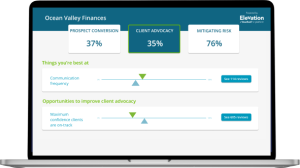When David James Wealth started asking clients what they really thought, everything changed. Here's how they turned feedback into their secret weapon for growth.
James Reiss runs David James Wealth, a firm that specialises in advising leaders in music, sport and business. After 10 years building his team, it has become increasingly apparent that the best and most effective way to improve your service is simply to ask your clients what they think.
“Initially, people are perhaps reluctant to get feedback, for fear of what it might be,” James explains. “But it’s a really powerful tool, whether the feedback’s good, bad, or ugly.”
For James, the real value isn’t in hitting targets, or meeting regulatory requirements. “I’ve never seen it as either. We’ve seen it as a way to make sure we’re getting genuine client feedback that can help us better deliver our advice and service.”
This year, David James Wealth won VouchedFor’s Small Financial Advice Firm of the Year award. Recognition that felt particularly meaningful because it came directly from the strength of the firm’s client feedback.
“It’s real validation for what we’re doing,” James reflects. “We couldn’t do it without our clients’ trust and feedback, because it is a gift.”
Making feedback part of the culture
The firm’s values include “always improving,” which made adopting feedback feel natural rather than imposed. However, it can still take time to get the whole team onboard. David James Wealth embedded client feedback into their business objectives and key results (OKRs), making it a quarterly focus rather than an afterthought.
“We blend VouchedFor and Elevation data into our OKRs every year, every quarter,” James explains. “It’s a focus for us and our business.”
One of the biggest revelations came from discovering the gap between what advisers think they’re communicating and what clients actually absorb.
“Even if an adviser covers something off in a meeting, the client might miss it because they’re trying to take on board so much information,” James notes. “When feedback shows a client saying ‘I don’t understand the fees,’ an adviser might think ‘we went through fees for 10 minutes.’ But you’re throwing a lot at them all at once.”
Instead of assuming information has landed, it is important to use feedback to identify what needs revisiting.
The unexpected power of prospect feedback
But David James Wealth’s advisers request feedback from everyone they meet.
“Every person that we engage with is sent a feedback request,” James says. This approach has revealed valuable insights about their initial meetings and helped drive impressive conversion improvements.
- Prospect’s understanding of fees jumped from 50% to 87.5%
- Prospective clients feeling comfortable discussing anything rose from 62.5% to 100%
- The percentage of prospective clients intending to become a client leapt from 62.5% to 93.75%
But James insists there’s no secret sauce. “It’s a process. If you just slowly build on things every day, week, month, quarter, year, then it all adds up.”
The bottom line
When asked what advice he’d give other firms, James is direct: “You need to have a way of measuring the service and value you’re delivering through client feedback. It’s a key element.”
The transformation at David James Wealth shows that firms should stop assuming they know what the client thinks, you must ask them. Sometimes the most powerful business tool is also the simplest: genuine curiosity about whether you’re doing a good job.
Learn how VouchedFor can help transform your firm’s approach to client feedback.




